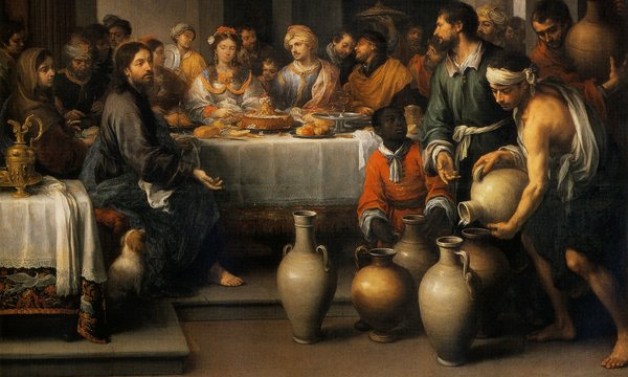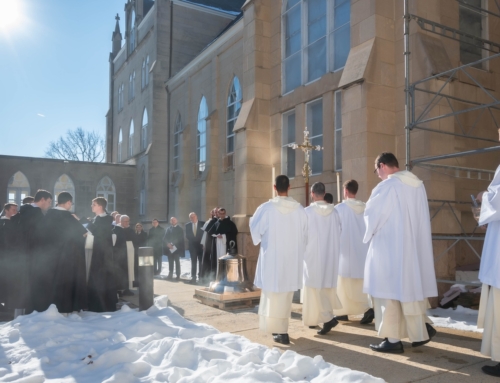“In wine there is truth.” This ancient proverb often applies in some not so becoming situations, explaining those unfortunate actions and words inspired by an extra drink or two. Although the phrase dates back to the Greco-Roman period, it is as true now as ever, but not as one would think. The Gospel readings for today and this past Sunday both include references to wine. Today we hear about the importance of placing new wine into new wine skins. Yesterday we heard the account of the miracle of the wedding feast at Cana, where Jesus turns water into wine. The images of wine and vineyards are numerous in his teaching. This leads us to ask the question, “How much truth can we find in wine?”
John recounts the miracle of the wedding feast at Cana in the second chapter of his Gospel. Our Lord’s first public miracle comes at the request and guidance of his mother. She tells the servants, “Do whatever He tells you.” (Jn 2:5). Our Lord then instructs the servants to fill the six stone jars that were designated for the Jewish purification rites. St. Bernard of Clairvaux sees the purpose of these jars in a purification that transcends the Jewish ritual cleansing. Before Christ works his miracle, these jars are empty. As St. Bernard says, they are “full of wind if they are used in vainglory.” The emptiness of the jars is a result of the fact that they are not fulfilling their purpose. They are to be used for purification, but as it is they are empty.
But the jars are not destined to be left full of wind. At the word of Jesus, the empty jars are filled with water. St. Bernard describes this water as symbolizing the fear of the Lord, “which having a simpler flavor, is yet supremely refreshing to the soul parched with evil desires. It is a water that can extinguish the fiery darts of the wicked one.” Bernard points to the importance of the fear of the Lord as the foundation for maturing in the spiritual life. The Book of Proverbs speaks of this fear as the genesis of two virtues: knowledge (Prv 1:7) and wisdom (Prv 9:10). Bernard continues, “But by divine grace this water is changed into wine, since perfect charity casts out fear (1 Jn 4:18).” And this is the goal, that what the Lord has begun in us may be brought to its fulfillment, that what begins with the fear of the Lord may be transformed by his grace into perfect charity, which is nothing less than sharing in His divine life.
At the wedding feast, Jesus turns water into wine. At the Last Supper, He turns wine into His very own blood. The miracle at Cana “announces the hour of Jesus’ glorification” (CCC 1335). This hour, which begins at Cana through the request of the Blessed Virgin Mary, comes to fulfillment in the upper room. The apostles are led to the location of the upper room when they are instructed to follow “a man carrying a jar of water” (Mk 14:13). Once again a jar of water becomes a sign for the preparation of the great work of our Lord. At the Last Supper, Jesus changes wine into His very own blood. This is the blood that is shed for our true purification and salvation on the cross. By partaking of this blood, we are ushered into the heavenly wedding feast where we share in his very life.
Beginning with the fear of the Lord we gain knowledge and wisdom through which we are united to God. In this life, this union takes place in its fullest sense when we consume the blood of Christ in the Eucharist. What presents itself to our senses as wine is truly the blood shed for our redemption and offered to the Father. In this “wine” is truth, not just any truth, but the fullest truth, the First Truth, Jesus Christ. In vino veritas, Prima Veritas.
✠
Image: Bartolome Esteban Murillo, Marriage Feast of Cana







